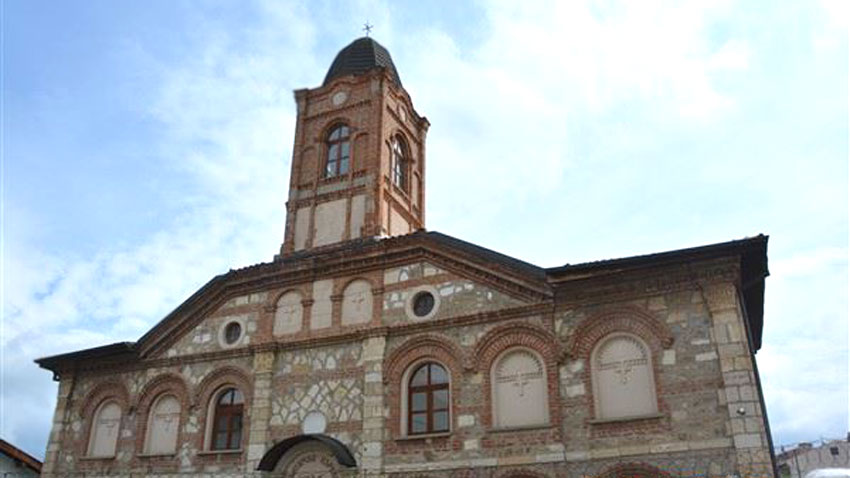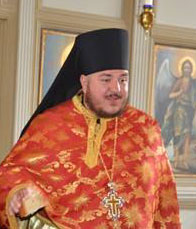The church of St. George the Great Martyr in Edirne was built in 1880 by permission of Sultan Hamid II in an architectural style typical of the late Bulgarian National Revival – an airy, high-ceilinged triple-nave basilica. Up until 1940 the priests here were Bulgarian citizens, after which they were replaced by Bulgarian priests from Istanbul, where another symbol of Bulgarian Orthodoxy rises - the iron church St. Stephen.

In 1951 the St. George church in Edirne closed doors to believers, fell into disuse and the building gradually fell into a state of dilapidation. It was then up to the patriotically-minded Bulgarians in Edirne like Philip Cikirik, who made every effort to keep the church building in good repair and who started its restoration, a plan for which was drafted in 2001. After being officially given the go-ahead by the Turkish authorities, the St. George church in Edirne was renovated and opened with an official ceremony on 9 May, 2004. Alongside the grand Episcopal Church St. Constantine and Helena, the St. George church is now a hub for Bulgarians in Edirne and is on the pilgrimage trail for many tourists. On the second floor of the renovated church a small ethnographic exhibition has been put together, presenting the life of the Bulgarian community in this part of Turkey:
 “There are many guests coming to Edirne now, both Bulgarian and Turkish. And when they see the church building in the marketplace they invariably go inside to take a look around,” says Alexander Cikirik, priest at the St. George church in Edirne. His son – Georgi Cikirik studies at the seminary in Plovdiv and father Alexander is hoping to see him one day continue the work of his forefathers. Here is more from Father Alexander about plans on the church’s patron saints’ day Gergyovden, St. George’s Day, May 6:
“There are many guests coming to Edirne now, both Bulgarian and Turkish. And when they see the church building in the marketplace they invariably go inside to take a look around,” says Alexander Cikirik, priest at the St. George church in Edirne. His son – Georgi Cikirik studies at the seminary in Plovdiv and father Alexander is hoping to see him one day continue the work of his forefathers. Here is more from Father Alexander about plans on the church’s patron saints’ day Gergyovden, St. George’s Day, May 6:
“As always on 6 May, this year we shall have many guests coming here from Bulgaria, Greece and Turkey. Thanks to the good contacts between the two neighbouring countries Bulgaria and Turkey, the tourist flow has increased. As in so many places across Bulgaria, on 6 May we play Bulgarian folk music and in the square in front of the church we celebrate Georgyovden together with our Turkish friends living here and the guests who have come from near and far. We always celebrate together – Christian as well as Muslim holidays – and together we pray for peace, love and understanding. We respect each other’s religion, because when we pray what are we asking of God? We all pray for health, happiness, respect, peace and love. That is what any religion wants. What matters most is, I think to work together, anyone can pray in any language they want. Prayers always sound the same.”
English version: Milena Daynova
Photos: courtesy of Alexander CikirikHelp me do it myself, get me in touch with nature, take care of my immunity – these are the principles that the teachers at the Bulgarian kindergarten "Hristo Botev" in the Slovak capital Bratislava follow. The kindergarten has been operating since 2009..
"The place in France where we draw together the future of our children in Bulgarian" - this is how Yaneta Dimitrova described her workplace - the Bulgarian Sunday School "Ivan Vazov" in Paris a year ago in a post on a social network. It is one of the 396..
21 February is International Mother Language Day, first proclaimed as such by UNESCO and later adopted by the UN General Assembly. The right to study and to speak one’s mother tongue, or native language, is a basic human right and a civil right..
Exactly a month after the Bulgarian National Radio solemnly celebrated its 90th anniversary, history continues its dialogue with us, its authors. With a..

+359 2 9336 661
